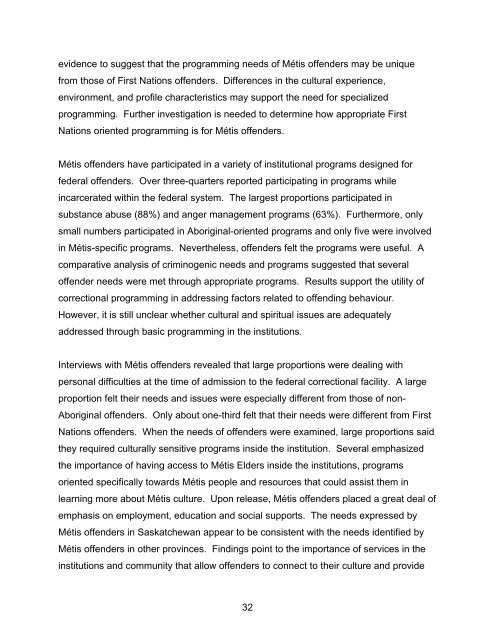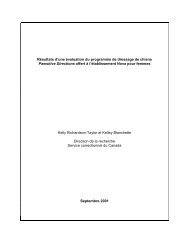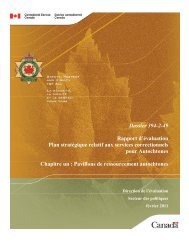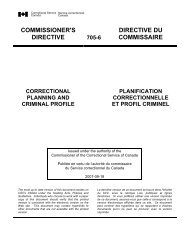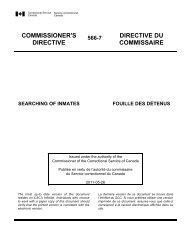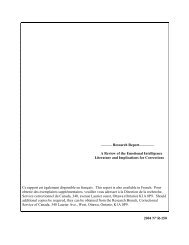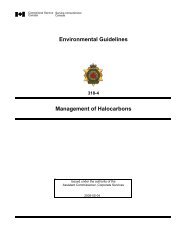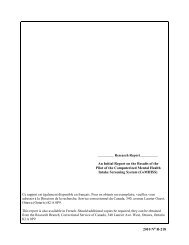Program and Service Needs of Federally Incarcerated Métis ...
Program and Service Needs of Federally Incarcerated Métis ...
Program and Service Needs of Federally Incarcerated Métis ...
Create successful ePaper yourself
Turn your PDF publications into a flip-book with our unique Google optimized e-Paper software.
evidence to suggest that the programming needs <strong>of</strong> <strong>Métis</strong> <strong>of</strong>fenders may be unique<br />
from those <strong>of</strong> First Nations <strong>of</strong>fenders. Differences in the cultural experience,<br />
environment, <strong>and</strong> pr<strong>of</strong>ile characteristics may support the need for specialized<br />
programming. Further investigation is needed to determine how appropriate First<br />
Nations oriented programming is for <strong>Métis</strong> <strong>of</strong>fenders.<br />
<strong>Métis</strong> <strong>of</strong>fenders have participated in a variety <strong>of</strong> institutional programs designed for<br />
federal <strong>of</strong>fenders. Over three-quarters reported participating in programs while<br />
incarcerated within the federal system. The largest proportions participated in<br />
substance abuse (88%) <strong>and</strong> anger management programs (63%). Furthermore, only<br />
small numbers participated in Aboriginal-oriented programs <strong>and</strong> only five were involved<br />
in <strong>Métis</strong>-specific programs. Nevertheless, <strong>of</strong>fenders felt the programs were useful. A<br />
comparative analysis <strong>of</strong> criminogenic needs <strong>and</strong> programs suggested that several<br />
<strong>of</strong>fender needs were met through appropriate programs. Results support the utility <strong>of</strong><br />
correctional programming in addressing factors related to <strong>of</strong>fending behaviour.<br />
However, it is still unclear whether cultural <strong>and</strong> spiritual issues are adequately<br />
addressed through basic programming in the institutions.<br />
Interviews with <strong>Métis</strong> <strong>of</strong>fenders revealed that large proportions were dealing with<br />
personal difficulties at the time <strong>of</strong> admission to the federal correctional facility. A large<br />
proportion felt their needs <strong>and</strong> issues were especially different from those <strong>of</strong> non-<br />
Aboriginal <strong>of</strong>fenders. Only about one-third felt that their needs were different from First<br />
Nations <strong>of</strong>fenders. When the needs <strong>of</strong> <strong>of</strong>fenders were examined, large proportions said<br />
they required culturally sensitive programs inside the institution. Several emphasized<br />
the importance <strong>of</strong> having access to <strong>Métis</strong> Elders inside the institutions, programs<br />
oriented specifically towards <strong>Métis</strong> people <strong>and</strong> resources that could assist them in<br />
learning more about <strong>Métis</strong> culture. Upon release, <strong>Métis</strong> <strong>of</strong>fenders placed a great deal <strong>of</strong><br />
emphasis on employment, education <strong>and</strong> social supports. The needs expressed by<br />
<strong>Métis</strong> <strong>of</strong>fenders in Saskatchewan appear to be consistent with the needs identified by<br />
<strong>Métis</strong> <strong>of</strong>fenders in other provinces. Findings point to the importance <strong>of</strong> services in the<br />
institutions <strong>and</strong> community that allow <strong>of</strong>fenders to connect to their culture <strong>and</strong> provide<br />
32


